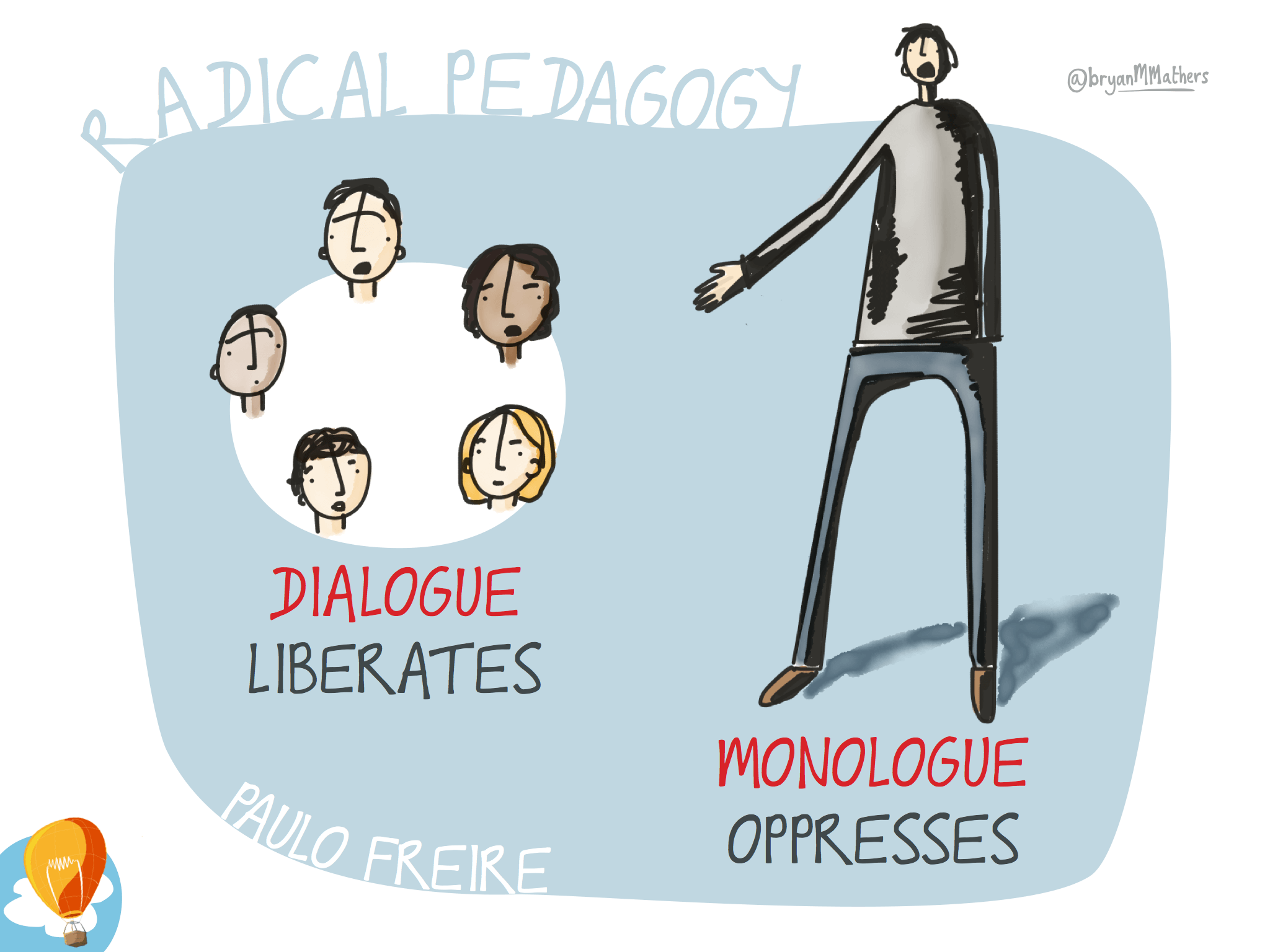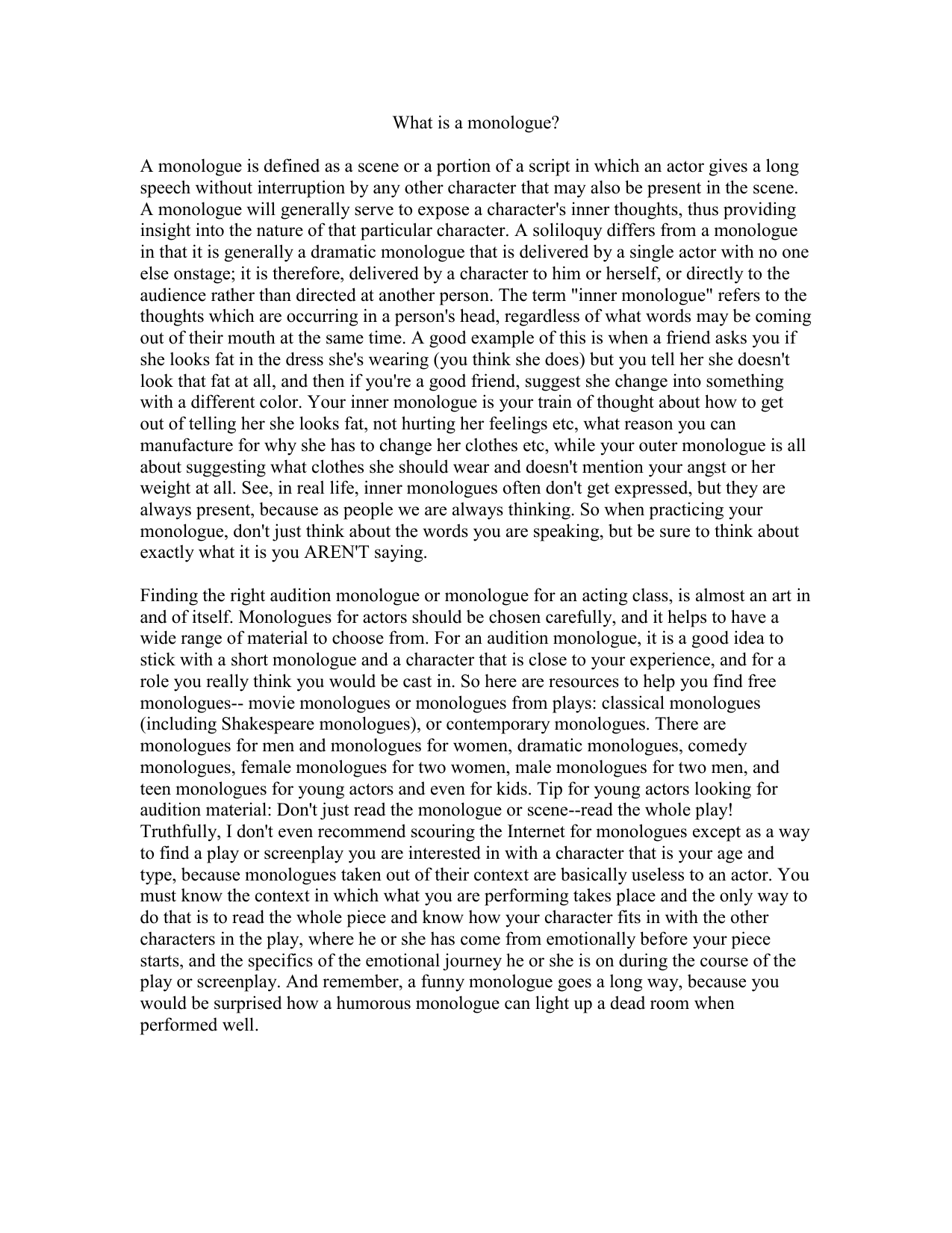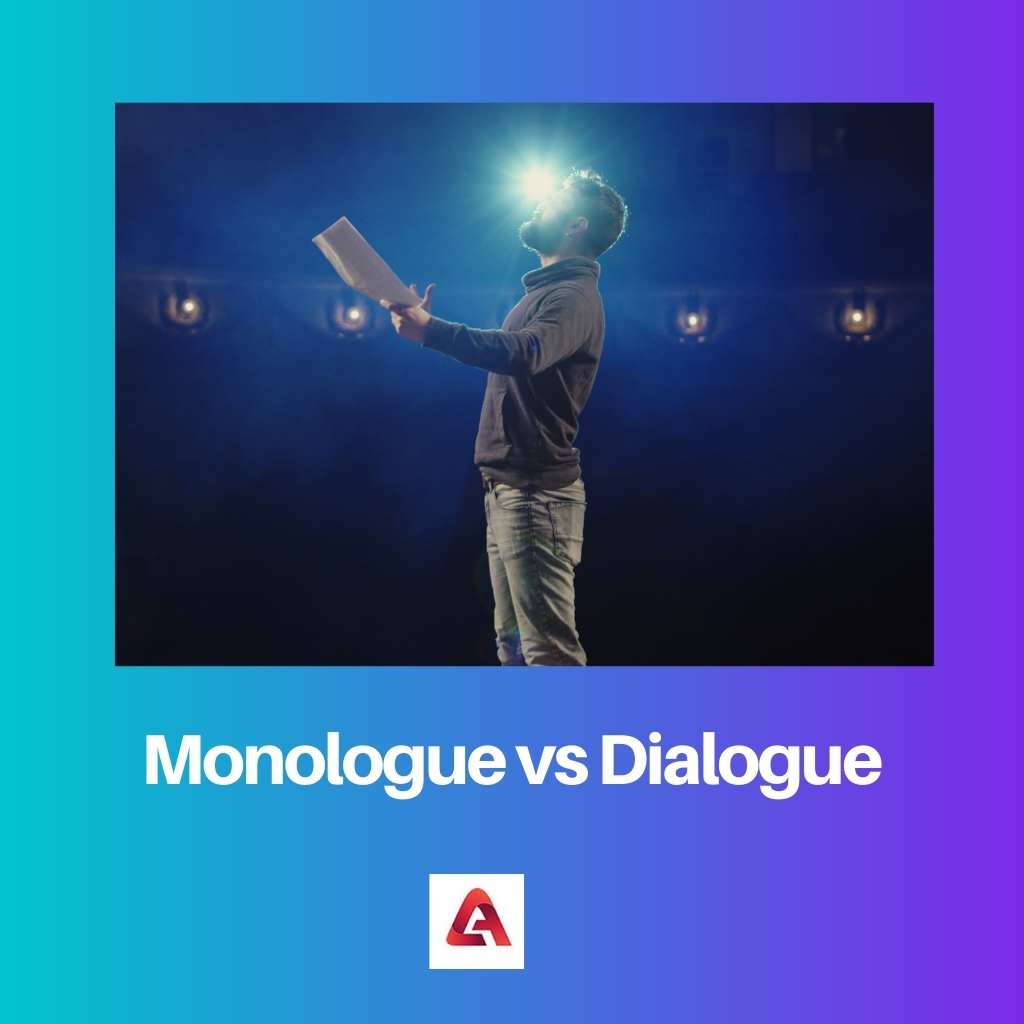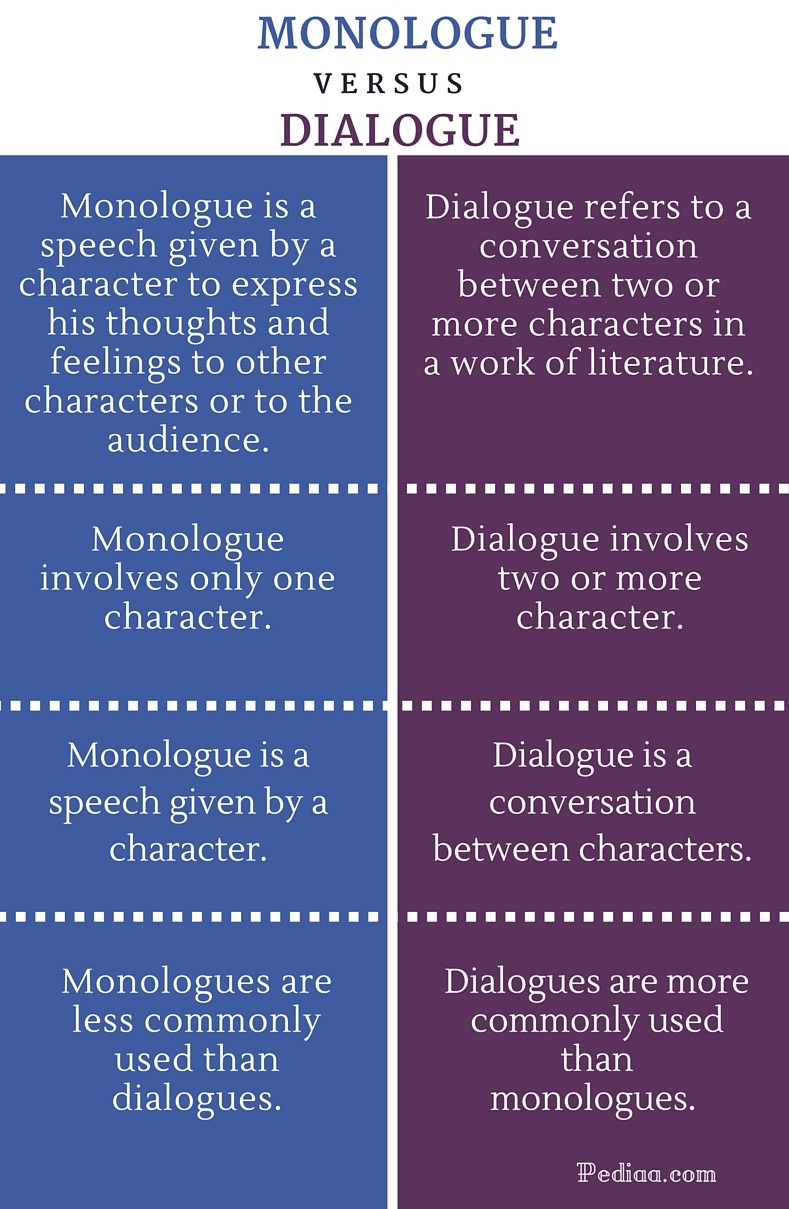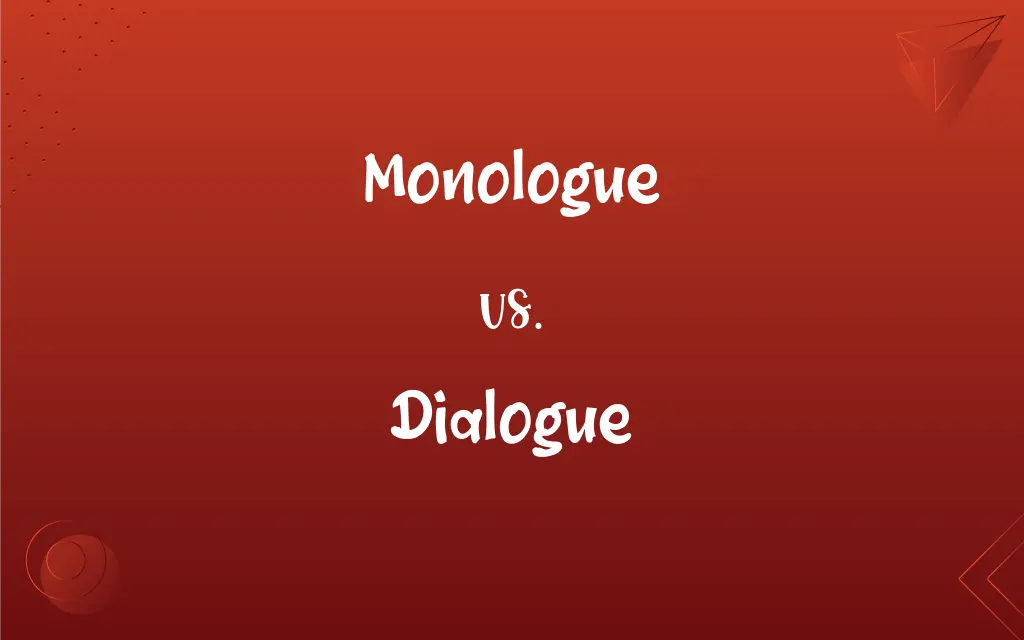Monologue Dialogue
Monologue Dialogue - While a monologue is a given by one character (“mono”=single), a dialogue is a conversation that occurs between two or more characters. Both are forms of speech or written exchanges in narratives or performances. Monologue refers to a speech delivered by a character in order to express his thoughts and feelings to other characters or the audience. Monologue and dialogue are two literary devices that involve speech. In contrast, a dialogue is an exchange of words between two or more characters, helping to. A monologue is a prolonged speech by a single speaker, while a dialogue is a conversation between two or more individuals. Monologues and dialogues are similar in that they both deliver language to the audience. A monologue is a speech given by one person, while a dialogue is a verbal interaction between two or more people. A monologue is an extended speech delivered by a single character, offering insight into their thoughts, feelings, and motivations. If we take a closer look at all the linguistic, symbolic and cultural aspects of these concepts, there are bigger.
If we take a closer look at all the linguistic, symbolic and cultural aspects of these concepts, there are bigger. A monologue is a prolonged speech by a single speaker, while a dialogue is a conversation between two or more individuals. While a monologue is a given by one character (“mono”=single), a dialogue is a conversation that occurs between two or more characters. In contrast, a dialogue is an exchange of words between two or more characters, helping to. Both are forms of speech or written exchanges in narratives or performances. Monologue and dialogue are two literary devices that involve speech. A monologue is an extended speech delivered by a single character, offering insight into their thoughts, feelings, and motivations. A monologue is a speech given by one person, while a dialogue is a verbal interaction between two or more people. Monologues and dialogues are similar in that they both deliver language to the audience. Monologue refers to a speech delivered by a character in order to express his thoughts and feelings to other characters or the audience.
Monologue refers to a speech delivered by a character in order to express his thoughts and feelings to other characters or the audience. Monologue and dialogue are two literary devices that involve speech. A monologue is a prolonged speech by a single speaker, while a dialogue is a conversation between two or more individuals. Both are forms of speech or written exchanges in narratives or performances. A monologue is a speech given by one person, while a dialogue is a verbal interaction between two or more people. While a monologue is a given by one character (“mono”=single), a dialogue is a conversation that occurs between two or more characters. In contrast, a dialogue is an exchange of words between two or more characters, helping to. If we take a closer look at all the linguistic, symbolic and cultural aspects of these concepts, there are bigger. Monologues and dialogues are similar in that they both deliver language to the audience. A monologue is an extended speech delivered by a single character, offering insight into their thoughts, feelings, and motivations.
Monologue and Dialogue Open Visual Thinkery
Monologues and dialogues are similar in that they both deliver language to the audience. In contrast, a dialogue is an exchange of words between two or more characters, helping to. Monologue and dialogue are two literary devices that involve speech. Monologue refers to a speech delivered by a character in order to express his thoughts and feelings to other characters.
Dramatic Monologue Meaning, Features and Examples Dramatic monologues
A monologue is a speech given by one person, while a dialogue is a verbal interaction between two or more people. Monologue refers to a speech delivered by a character in order to express his thoughts and feelings to other characters or the audience. Monologue and dialogue are two literary devices that involve speech. Both are forms of speech or.
Monologue examples seryfile
A monologue is a speech given by one person, while a dialogue is a verbal interaction between two or more people. While a monologue is a given by one character (“mono”=single), a dialogue is a conversation that occurs between two or more characters. In contrast, a dialogue is an exchange of words between two or more characters, helping to. Both.
Monologue vs Dialogue Difference and Comparison
In contrast, a dialogue is an exchange of words between two or more characters, helping to. A monologue is a speech given by one person, while a dialogue is a verbal interaction between two or more people. A monologue is a prolonged speech by a single speaker, while a dialogue is a conversation between two or more individuals. Both are.
Monologue,dialogue and soliloquy YouTube
If we take a closer look at all the linguistic, symbolic and cultural aspects of these concepts, there are bigger. Both are forms of speech or written exchanges in narratives or performances. In contrast, a dialogue is an exchange of words between two or more characters, helping to. A monologue is a prolonged speech by a single speaker, while a.
Difference Between Monologue and Dialogue
If we take a closer look at all the linguistic, symbolic and cultural aspects of these concepts, there are bigger. Monologue and dialogue are two literary devices that involve speech. While a monologue is a given by one character (“mono”=single), a dialogue is a conversation that occurs between two or more characters. In contrast, a dialogue is an exchange of.
Monologue or dialogue?
Monologue refers to a speech delivered by a character in order to express his thoughts and feelings to other characters or the audience. In contrast, a dialogue is an exchange of words between two or more characters, helping to. Monologues and dialogues are similar in that they both deliver language to the audience. A monologue is a prolonged speech by.
Soliloquy, Aside, Monologue, Dialogue Definitions and Examples From
Both are forms of speech or written exchanges in narratives or performances. If we take a closer look at all the linguistic, symbolic and cultural aspects of these concepts, there are bigger. Monologue and dialogue are two literary devices that involve speech. While a monologue is a given by one character (“mono”=single), a dialogue is a conversation that occurs between.
Dialogue vs monologue YouTube
A monologue is a speech given by one person, while a dialogue is a verbal interaction between two or more people. Monologue and dialogue are two literary devices that involve speech. In contrast, a dialogue is an exchange of words between two or more characters, helping to. Both are forms of speech or written exchanges in narratives or performances. Monologue.
Monologue vs. Dialogue What’s the Difference?
In contrast, a dialogue is an exchange of words between two or more characters, helping to. While a monologue is a given by one character (“mono”=single), a dialogue is a conversation that occurs between two or more characters. Monologue and dialogue are two literary devices that involve speech. A monologue is a prolonged speech by a single speaker, while a.
Both Are Forms Of Speech Or Written Exchanges In Narratives Or Performances.
While a monologue is a given by one character (“mono”=single), a dialogue is a conversation that occurs between two or more characters. A monologue is a speech given by one person, while a dialogue is a verbal interaction between two or more people. A monologue is an extended speech delivered by a single character, offering insight into their thoughts, feelings, and motivations. Monologue and dialogue are two literary devices that involve speech.
Monologue Refers To A Speech Delivered By A Character In Order To Express His Thoughts And Feelings To Other Characters Or The Audience.
In contrast, a dialogue is an exchange of words between two or more characters, helping to. A monologue is a prolonged speech by a single speaker, while a dialogue is a conversation between two or more individuals. Monologues and dialogues are similar in that they both deliver language to the audience. If we take a closer look at all the linguistic, symbolic and cultural aspects of these concepts, there are bigger.
